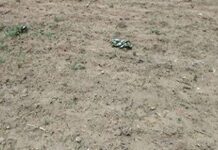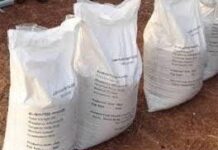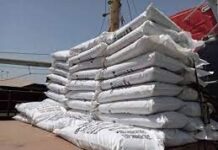The National Famers’ Platform of the Gambia (NFPG) with funding from the Forest and Farm Facility (FFF) under the auspicious of the Food and Agricultural Organization (FAO) on Monday 20th September 2015 launched the NFPG website for farmers at the Wellingara Horticultural Centre.In his welcoming statement during the launching ceremony, the president of The National Farmers Platform the Gambia (NFPG), Alagie Bassi Mboge, indicated among other things that the origins of National Farmers’ Platform can be traced back to the Praia (Cape Verde) Conference of June, 1994, at which time CILSS agreed to help its member states to facilitate the creation of farmers’ platforms at the local, national and sub-regional levels.
In order to elaborate a strategy for meeting this objective, he said, a series of meetings were held in Thies (Senegal) and Selingue (Mali) in February 1996 and then in Koudougou (Burkina Faso) in April 1996.
President Mboge stated that at the Koudougou meeting, the Gambian delegation set itself the task of holding meetings with farmers throughout the country so as to enable progressive selection of farmers’ platform representatives at the village, district, divisional and national level.
He noted that with the technical guidance of the Department of Planning (Department of State for Agriculture) and AFET, two platform members (one man and one woman) were selected by each of The Gambia’s roughly 1,500 villages, and farmers were identified for inclusion in executive committees in each of the 35 Districts and that these Districts representatives met in 1996 to elect Divisional Platform representatives and a national-level Executive committee, including a President and vice-President.
Mboge stated that the first full national meeting of the Platform was held in Mansakonko in February of 1997 and they were now launching a website for the platform, thanks to FAO for supporting farmers through the Forest and Farm Facility programme for the development of a website.
“We have benefited from the signing of an agreement for the implementation of programmes for producer groups,” he stated.
The president of the National Farmers platform stated that they cannot talk about the Forest and Farm Facility without reflecting on the key roles carried by NACO and the Country Facilitator Kanimang Camara for guiding the whole process of implementation of the facility in The Gambia.
“We as the National Farmers platform owe him a lot of gratitude as well as you the members and partners to the platform” he said.
For his part, the National Facilitator for FFF, Kanimang Camara, said FFF was launched in The Gambia in 2013 and since the launching of the FFF in The Gambia, they have been working on key pillars of support and one of the key pillars of FFF is ensuring that farmers’ voice is heard at all levels and the second pillar is ensuring that government cross sectorial coordination is nurtured and supported.
According to him, the rationale behind creating the website is to ensure there is linkage between farmers themselves, between farmers and producers and between farmers and other actors along the chain.
Kanimang stated FFF with the support of key partners, like IUCN (International Union for the Conservation of Nature) and FAO, since early 2014 have concluded a letter of agreement with the farmers and one of the key activities under this agreement is supporting them with webpage designing, and also setting up this webpage alongside training of key executive members to maintain the webpage. He noted that these are key aspects of their communication plan for ensuring that farmers’ voices are heard.
He concluded by saying that they have seen that farmers are facing difficulty in marketing and it is a key constraint, and one of the key activities of FFF is creating linkages between those producers and key actors along the chain. He said this webpage should serve as a platform for information sharing.
In his launching statement, Yankuba Sawo, representing the FAO country representative at the function, said the FFF project is an important initiative, which FAO supports, in order to help in the building of the country’s forest and ecosystem.
Mr Sawo stated “We cannot have good agricultural production and productivity without having good environment” and “Good environment means having good forest cover in our midst.” He said the project team worked very hard to realise the development and launching of the website.
On his part, Lamin Camara, representing the Chairperson of the Agriculture and Natural Resource working group indicated that the website is very important for information sharing and is a platform that farmers can use to reach their counterparts in other parts of the country and beyond.
He challenged the NFPG to adopt best practices through sharing information, as well as adopt and implement good ideas from outside.


















